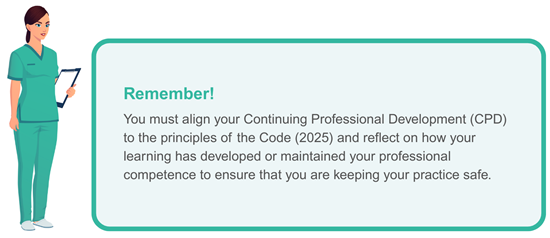What is Competence?
Competence is the integration of knowledge, professional judgment, skills, ethical values and attitudes necessary for safe, accountable and effective practice. Competence ensures that practitioners can deliver high-quality care that meets the needs of individuals and communities while promoting safety and wellbeing.
Competence changes and develops over time. A practitioner's level of competence is influenced by their educational preparation, frequency of clinical exposure and the duration of their experience in particular clinical settings. Since competence is not constant, you must continually re-evaluate your professional competence and keep your knowledge, skills, and performance up to date and relevant to your practice. Practitioners should also recognise the continuum of competence and reflect on where they currently are in relation to specific skills—acknowledging, that they may be at different stages across different aspects of their practice (e.g. (novice, advanced beginner, competent, proficient, and expert, (Benner, P. 2000)).
Competence is a principle of the Code of Professional Conduct and Ethics for Registered Nurses and Registered Midwives, incorporating the Scope of Practice and Professional Guidance (2025). As a registered practitioner, you must comply with the principles of the Code.
Continuing Professional Development (CPD)
NMBI do not specify the CPD that you must do, it should be broad and varied and include examples from the following categories:
- Work based learning
- Professional Activity
- Formal Education
- Self-directed learning
